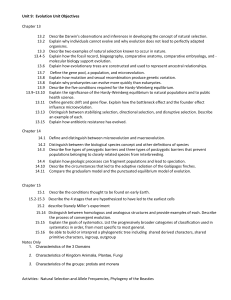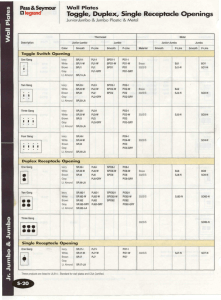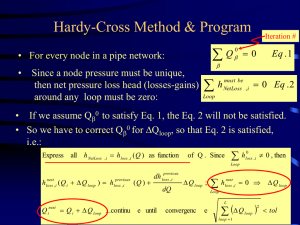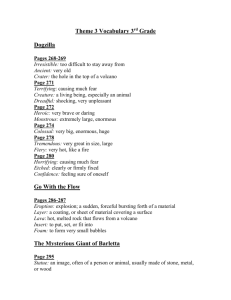The Translation Inquirer John Decker
advertisement
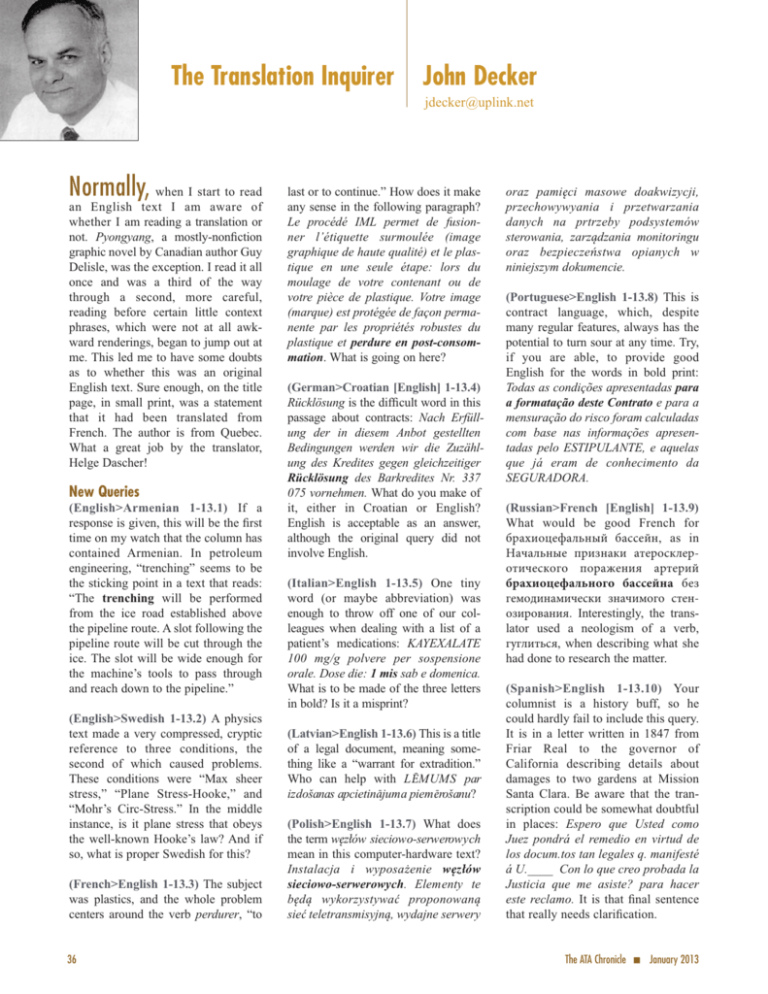
The Translation Inquirer John Decker jdecker@uplink.net Normally, when I start to read an English text I am aware of whether I am reading a translation or not. Pyongyang, a mostly-nonfiction graphic novel by Canadian author Guy Delisle, was the exception. I read it all once and was a third of the way through a second, more careful, reading before certain little context phrases, which were not at all awkward renderings, began to jump out at me. This led me to have some doubts as to whether this was an original English text. Sure enough, on the title page, in small print, was a statement that it had been translated from French. The author is from Quebec. What a great job by the translator, Helge Dascher! New Queries (English>Armenian 1-13.1) If a response is given, this will be the first time on my watch that the column has contained Armenian. In petroleum engineering, “trenching” seems to be the sticking point in a text that reads: “The trenching will be performed from the ice road established above the pipeline route. A slot following the pipeline route will be cut through the ice. The slot will be wide enough for the machine’s tools to pass through and reach down to the pipeline.” (English>Swedish 1-13.2) A physics text made a very compressed, cryptic reference to three conditions, the second of which caused problems. These conditions were “Max sheer stress,” “Plane Stress-Hooke,” and “Mohr’s Circ-Stress.” In the middle instance, is it plane stress that obeys the well-known Hooke’s law? And if so, what is proper Swedish for this? (French>English 1-13.3) The subject was plastics, and the whole problem centers around the verb perdurer, “to 36 last or to continue.” How does it make any sense in the following paragraph? Le procédé IML permet de fusionner l’étiquette surmoulée (image graphique de haute qualité) et le plastique en une seule étape: lors du moulage de votre contenant ou de votre pièce de plastique. Votre image (marque) est protégée de façon permanente par les propriétés robustes du plastique et perdure en post-consommation. What is going on here? (German>Croatian [English] 1-13.4) Rücklösung is the difficult word in this passage about contracts: Nach Erfüllung der in diesem Anbot gestellten Bedingungen werden wir die Zuzählung des Kredites gegen gleichzeitiger Rücklösung des Barkredites Nr. 337 075 vornehmen. What do you make of it, either in Croatian or English? English is acceptable as an answer, although the original query did not involve English. (Italian>English 1-13.5) One tiny word (or maybe abbreviation) was enough to throw off one of our colleagues when dealing with a list of a patient’s medications: KAYEXALATE 100 mg/g polvere per sospensione orale. Dose die: 1 mis sab e domenica. What is to be made of the three letters in bold? Is it a misprint? (Latvian>English 1-13.6) This is a title of a legal document, meaning something like a “warrant for extradition.” Who can help with LĒMUMS par izdošanas apcietinājuma piemērošanu? (Polish>English 1-13.7) What does the term węzłów sieciowo-serwerowych mean in this computer-hardware text? Instalacja i wyposażenie węzłów sieciowo-serwerowych. Elementy te będą wykorzystywać proponowaną sieć teletransmisyjną, wydajne serwery oraz pamięci masowe doakwizycji, przechowywyania i przetwarzania danych na prtrzeby podsystemów sterowania, zarządzania monitoringu oraz bezpieczeństwa opianych w niniejszym dokumencie. (Portuguese>English 1-13.8) This is contract language, which, despite many regular features, always has the potential to turn sour at any time. Try, if you are able, to provide good English for the words in bold print: Todas as condições apresentadas para a formatação deste Contrato e para a mensuração do risco foram calculadas com base nas informações apresentadas pelo ESTIPULANTE, e aquelas que já eram de conhecimento da SEGURADORA. (Russian>French [English] 1-13.9) What would be good French for брахиоцефальный бассейн, as in Начальные признаки атеросклеротического поражения артерий брахиоцефального бассейна без гемодинамически значимого стенозирования. Interestingly, the translator used a neologism of a verb, гуглиться, when describing what she had done to research the matter. (Spanish>English 1-13.10) Your columnist is a history buff, so he could hardly fail to include this query. It is in a letter written in 1847 from Friar Real to the governor of California describing details about damages to two gardens at Mission Santa Clara. Be aware that the transcription could be somewhat doubtful in places: Espero que Usted como Juez pondrá el remedio en virtud de los docum.tos tan legales q. manifesté á U.____ Con lo que creo probada la Justicia que me asiste? para hacer este reclamo. It is that final sentence that really needs clarification. The ATA Chronicle n January 2013 E-mail queries and responses by the first of each month to jdecker@uplink.net (subject line: The Translation Inquirer). Generous assistance from Per Dohler, proofreader, is gratefully acknowledged. Replies to Old Queries (Danish>English 8-12.1) (andet punktum): This most likely is the second sentence in a short section, writes Peter Christensen, and the term means the “second item” in the section. Helen Hasselriis defines it as “Point Two.” (Dutch>English 10-12.1) (fiscaal tehuis): Dan Lufkin calls this a “fiscal shelter.” For instance, “XXX thereby agrees to furnish the advisory office with the necessary information with a view to setting up the tax returns and, particularly, the total income received by the fiscal shelter.” Also, thanks to Dan for correcting bijonder to bijzonder. (German>Italian [English] 7-12.5) (Stadterhebung): In English, says Ilse Andrews, this means “incorporation” as a town or city. Apparently the Italian is incorporazione. Katya Howard prefers “gaining town status.” (German>Russian [English] 8-12.7) (Vollstreckungshilfeverkehr): Cheryl Fain likes “assistance by enforcement” for this. The entire sentence reads: “Assistance by enforcement under the Convention on the Transfer of Sentenced Persons of March 21, 1983.” Roland Greifer clarifies that Vollstreckungshilfe is “assistance in the execution of a (foreign) judgment.” The text is requesting a prisoner transfer in accordance with the above Upcoming Events The ATA Chronicle n January 2013 treaty. The underlying law is the Transferübereinkommens-Ausfüh rungsgesetz, which inevitably has its own initialism, TransfÜbkAG. (Greek>English 9-12.4) (εκποιητική δικαιοπραξία): Lefteris Kafatos says this simply means “transfer of legal rights.” (Italian>English 9-12.5) (ossitaglio): This is “oxycutting,” says Jacopo Madaro, referring to a metal-cutting technique using an oxyacetylene torch. (Italian>English 9-12.6) (strappi in progressione): Lorraine Axelson offers “successive spurts” for this, and expands the phrase: “(an ascent comprising) three successive spurts [equal] both for their length and their steepness.” Jacopo Madaro renders it as “a set of three sprints, one after the other,” and the location is the Monte delle Sante Marie. Peter Christensen provided a response I have not seen in my nearly two decades of umpiring this column. He sent in a digital picture of such strappi or sections showing the Muro (synonymous with strappo) di Sormano. I wish I could reproduce it here, because, as an active bicycler, I find it to be the kind of outrageous hairpin-turn-plusupgrade that I really never want to see, not even in a bad dream. is “pelvic area,” and again Lorraine Axelson provides the entire phrase: “a jersey top [sweater] with two tucks [darts] at the neck, thus making it a boat neck, and then wide at the bottom across the pelvic area.” Alessandra Levine defines it as “wider in the pelvis (hip) area.” For Jacopo Madaro, it is cintura in Spanish (Alessandra Corazza agrees), and by expanding the phrase a bit, we get y una cintura más ancha. (Spanish>English 9-12.8) (el aperte obligatorio proveniente de los descuentos efectuados): For this, Maria Bilbao provides: “the mandatory contribution from withholdings made from paychecks to all the workers in the country.” These withholdings were imposed to support (what else?) social programs. (Spanish>English 10-12.8) (chintear): Basically, says Sheldon Shaffer, this verb is a Spanglish concoction for the crude English synonym of “to defecate.” And here all along the Translation Inquirer thought that cagar sufficed to convey this meaning. The Translation Inquirer wishes to express his thanks to Per Dohler, who has faithfully proofread this column for a number of years. Thanks again to everybody who contributed, and a Happy New Year! (Italian>Spanish [English] 9-12.7) (bacino): One possible solution to this January 18-20, 2013 January 25-27, 2013 May 17-19, 2013 International Medical Interpreters Association Annual Conference Miami Beach, FL www.imiaweb.org/conferences ATA Translation Company Division Conference 13th ATA-TCD Conference Orlando, FL www.ata-tcd.com National Association of Judiciary Interpreters and Translators 34th Annual Conference St. Louis, MO www.najit.org 37

